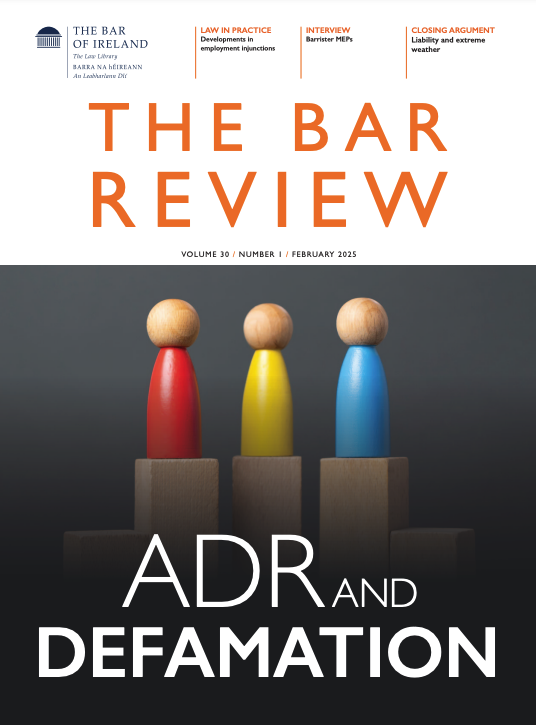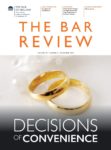The October issue of The Bar Review includes an interview with Niamh Howlin on her new book charting the barristers’ profession, as well as analysis on the law surrounding co-habiting couples by Jane Barron BL. Cathy Smith SC & Aoife Farrelly BL explore the impact of mediation of personal injuries, while Gordon Walsh BL takes a detailed look at shadow banking.
Highlights from October Issue
Interview: Niamh Howlin on her book Barristers in Ireland: An Evolving Profession

Niamh Howlin spoke to The Bar Review about her new book, Barristers in Ireland: An Evolving Profession since 1921.
Niamh Howlin’s fascination with legal history began while taking a module in the subject as part of her BCL at UCD, where she was taught by the legendary Prof. Nial Osborough. A PhD under Prof. Osborough followed, looking at juries in Ireland in the 19th century. This led her to an academic career, which began at Queen’s University Belfast, before she returned to UCD as a lecturer in 2013. She is now an Associate Professor at the Sutherland School of Law in UCD. She has published extensively on the 19th century Irish jury system, and on other aspects of criminal justice history, but her latest book moves the focus to the 20th century, and to the Bar and barristers in Ireland.
Redress for Cohabitants

The law relating to redress for cohabitants on the ending of a relationship is complicated, but will affect more and more persons as the number of unmarried couples increases.
The concept of family life has changed dramatically in Ireland in recent times and this change is particularly evident in the number of couples who choose not to get married. According to Central Statistics Office profiling of households and families in the 2016 census: “While there were 1,218,370 families in the State on Census Night, 862,721 of these were families with children, an increase of 28,455 since 2011. The number of married couples with children increased by 1.7% to 568,317, while the number of cohabiting couples with children increased by 25.4% to 75,587”. This statistic shows that the number of cohabiting couples (or at least those with children) has significantly increased as against those who are married.
Intermediary Regulation: An Irish Solution to a Global Shadow Banking Problem

The regulation of so-called ‘shadow banks’ is an ongoing challenge for legislators both at national and EU level.
How would one address a potential €10 trillion contagion in the global financial market? This is the question financial regulators are asking as they debate how to properly regulate the shadow banking sector. This article will explain: i) the concept of shadow banks; ii) how they differ from traditional banking institutions; iii) the steps taken to regulate these entities in the name of consumer protection; and, iv) what can be gleaned from these efforts as European/national regulators start tackling the shadow banking problem more broadly.
Mediating Personal Injuries Disputes

By Cathy Smith SC & Aoife Farrelly BL
The use of mediation in personal injuries disputes is now well established; however, the Personal Injuries Resolution Board Act, 2022 is likely to significantly impact on this process.
Mediation is a well-established and valuable tool in the resolution of myriad forms of dispute. Traditionally, personal injuries claims were not routinely included in the types of dispute where mediation played a role. However, that will change fundamentally due to the provisions of the Personal Injuries Resolution Board Act, 2022 (PIRB Act). While the third and final phase of the 2022 Act has yet to be commenced, it is worthwhile to consider the impact of increased mediation on the resolution of personal injury claims.
This article will assess the role that mediation can play in the resolution of disputes involving personal injuries, and outline the role of lawyers in that process.
Listen to the Podcast on this article:
Download The Bar Review – Volume 28 Issue 4

